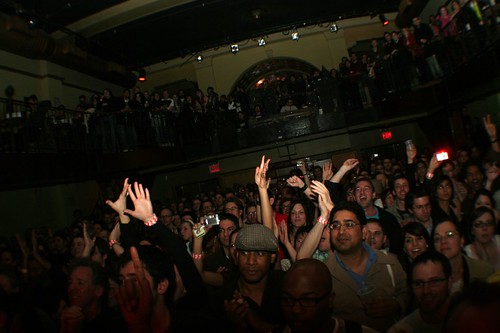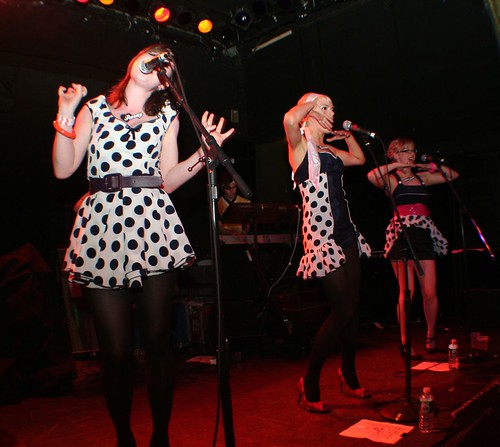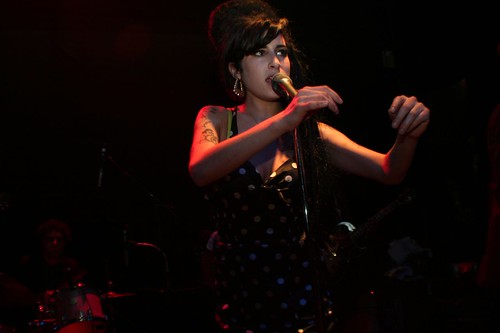In late November, early December, one of my co-workers started playing a song over and over again that had the catchiest hook of “they tried to make me go to rehab / I said ‘no, no, no.'” It was sung by a woman with a deep, exotic voice that was accompanied by a dance-rhythmed brass track complete with clapping, and had the most pleasant way of repeatedly popping up in your mind. After hearing it several times, the rest of my coworkers and I eventually inquired after the artist. It was Amy Winehouse, a British songstress who had enormous success in her home country but had yet to break into the US. Well, at the time, anyhow.
She came to New York City about a month later, performing at Joe’s Pub — a tiny, intimate club. When we found out, the show was already sold out. Two of my co-workers managed to score tickets through connections. They said she was great, but nervous, and apparently Jay-Z and a handful of other music celebs were in attendance. After obsessive checking of tour dates, we found out she was coming back in March, and my entire department at work (well, save our male co-workers) bought tickets at the exact minute they went on sale. It was the smartest thing we could’ve done — by the next day, the show was sold out. Two of my coworkers each bought an extra pair of tickets, which they sold on craigslist. Each pair sold for roughly $400, or $200/ticket (for comparison purposes: $200 is how much I paid for one ticket to see concerts by the Eagles & Roger Waters, and half of what I paid to see the Rolling Stones).
One could offer any number of guesses at the explanation. Opening for Amy Winehouse would be the Pipettes, another UK-based act who wrapped their lips around the blogging world with the song “Your Kisses are Wasted on Me,” and later their album, We Are The Pipettes. There’s also Winehouse’s incredible popularity in the UK — her debut went Platinum and earned her a Mercury Music Prize Nomination. Much like with Lilly Allen, in the US her reputation preceeded the music, as Winehouse was spread all over gossip blogs and tabloids for her very public battle with drinking and the resulting rowdy behavior, including throwing up on stage and punching people. Back to Black was originally set to release in the US on March 20th, but the release date got pushed up to coincide with the show.
The Pipettes are three cute women with good voices, so their popularity requires little explanation (especially when considering the popularity of the Dreamgirls soundtrack). They’ve got a gimmick and they know how to play it — with coordinated outfits and dance moves, necklaces with their names on them, and complementary personalities. The brunette is the sweet, shy one who hides behind her bangs and turned 21 on the night of the show. The blonde is the strong, beautiful type, who smiled with her lips and swung her hips. The redhead (well, reddish blonde) is the quirky one, who wore glasses, a “dress” that was actually shorts, and exaggerated her expressions and dance moves.
Their music is equally formulaic: indie pop song 1.5 – 2.5 minutes in length steeped in the old girl-group tradition while modernizing it just slightly, with today’s rock instruments and mindsets (best exemplified by their frank topic matter, like keeping one night stands as one night stands).
During “Why Did You Stay?” the girls say, “well, I’ve had just about enough of sweet,” which convenientally summarizes exactly how I feel about the Pipettes. Their live show is well put together and fun to watch, but the music is to traditional girl groups as a sugar substitute is to sugar — sweeter, less substantial and noticeably fake.
The Pipettes: “Why Did You Stay?” (download)
From the moment Amy Winehouse’s portion of the evening began, it was clear that we would be treated to a more matured revival than that of the Pipettes. The lights dimmed, the brass section pierced the air, and with an announcement, Amy Winehouse took the stage to an already applauding house. We were in love with her from the beginning, cheerleaders to her cause.
Ably backed by the Dap Kings and two attractive male back-up singers/dancers in suits, Winehouse opened with “Addicted,” and set the tone for the rest of the show. Despite the weary emotions in her music and lyrics, the overall mood tonight was cheery and upbeat. The audience cheered each time she took a sip of her drink, and even heckled her with cries of “more beer,” but she took little offense. “Women don’t drink beer,” she joked, “they chug it.”
She soared through the songs from Back to Black, a few from Frank, and an impressive cover of Lauryn Hill’s “Doo Wop (That Thing),” all the while slipping easily between a cocky shout and swagger and a demure purr. During one song, she frequently hid behind her hands, during another she was hiking her skirt. At one point she briefly lost track in a song, at the end of which, she remarked “at least I got this far without fucking up,” before launching into “You Know I’m No Good,” the first US single. Sure, a lot of this could be an act, but if it is, it’s a highly convincing one.
Maybe it’s plain and simply the music. Or maybe it’s her honesty. Maybe it’s our sinister sense of schadenfreude. Regardless of whatever the specific draw of Amy Winehouse may be, she proved it was more than warrented. Rarely have I seen such a diverse crowd (in every meaning of the word), or a crowd having such a good time. Just ahead of me and to the right, a group of early 20-somethings smoked a joint and started a miniature dance circle. To the left, a woman in her 40s danced with her significant other. Much like “Rehab,” this was not a cry for help. No, no, no. It was a celebration of our vices and the pleasure they bring, however fleeting.
Amy Winehouse: “Rehab” (download)
Amy Winehouse: “Love Is A Losing Game” (download)
BONUS:
Sharon Jones & The Dap Kings: “All Over Again” (download)
Also there:
Rolling Stone
Arjan Writes
Images courtesy of flickr user undergrounder





11 comments
EF Matt says:
Mar 16, 2007
well done Taylor, awesome review as always.
Py Korry says:
Mar 16, 2007
Great review! I’m looking forward to hearing this songs. I can’t believe the price of the tickets! JEEEsus!
Taylor says:
Mar 16, 2007
Thanks!
It was pretty crazy — luckily I only had to pay the face price of $15 🙂
DOM says:
Mar 16, 2007
This IS a great review, Taylor. Do I wish I could have been there? I say Yes, Yes, Yes……
joe says:
Mar 16, 2007
Jealous!
Jen says:
Mar 16, 2007
I love Amy Winehouse. Her voice soothes my soul and a style that is not found in music these days. Most female artists are so plastic, but she sets a new level. Not only can I relate to her lyrics, but also as a person. She isn’t afraid to be judge by her tattoo’s and unique style. I have respect for such a free-will soul. I hope she plans more tour dates in USA.
Taylor says:
Mar 16, 2007
There’s definitely a lot to respect about her. She’s got a couple more dates… I know she’s coming through NYC again. BrooklynVegan has the rest of her show dates here.
jason says:
Mar 16, 2007
i’ve tried listening to a few tracks, and i don’t understand the hype. i think it’s because i’ve never been a fan of the motown sound, so anyone aping it isn’t going to appeal as much.
Taylor says:
Mar 17, 2007
I’m sure that has something to do with it… I’ve gotten more and more into all forms of soul over the past year, so I absolutely love it.
jason says:
Mar 17, 2007
give me stax any day 🙂 i’m really glad they’re starting to reissue those albums, but i can always rely on the singles box set. it’s part of why i loved the latest cat power; really was her “dusty in memphis”, to some degree.
LISTEN UP: Amy Winehouse Sobers Up Long Enough To Be Awesome says:
Jul 6, 2012
[…] Winehouse bothered to show up to one of her scheduled performances and ended up impressing T-Sides enough to post a few of her […]